Part 39: Years of Recovery
Chapter 7 – Years of Recovery – 1520 to 1540Sultan Hakam was still shy of thirty years, but he had already stormed halfway across Iberia in a short but resoundingly successful campaign, hammering a name for himself as he did so. He had managed to earn the support and loyalty of a few powerful emirs, he had outmaneuvered the Majlis and pursued his own goals, and his name was already famous all across Europe… but all at the cost of his kingdom’s stability.
A large rebellion broke out early in 1520, with thousands of disenfranchised and persecuted Leónese Christians rising up, hoping to carve out a principality of their own.

Hakam, of course, could not stand for this. He was hailed as Sayfullah-come-again by his soldiers, whom he personally led into the battle against the rebels, crushing them after a bloody skirmish in the streets of Salmanika.


The rebel leaders were executed and their heads’ were mounted on the city walls, but rather than dissuade any further rebellions, this only led sparked another massive revolt in Madrid.

Once again, Hakam led the New Mubazirun to crush the rebels, but the Castilians put up a much stiffer fight. It was only after a long, drawn-out engagement that the Castilians were defeated, and at the cost of 5000 dead Andalusi.


Even worse, the Sultan’s life had come under threat in the midst of the fighting, with a terrifying Christian warrior fighting his way across the battlefield. Hakam was surrounded by his best guardsmen, of course, but this seven-foot giant in iron armour cut them down like ragdolls, knocked Hakam off his horse and nearly skewered him before being killed, peppered with dozens of arrows and lances.
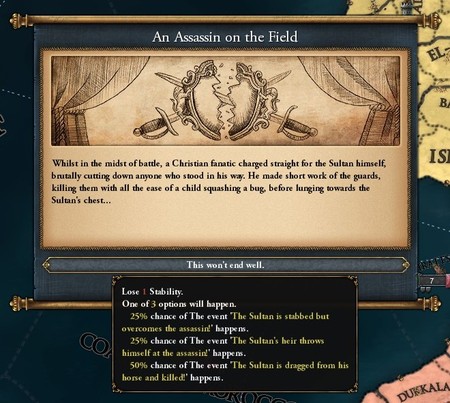
The wound was a very close call, with the blade missing Hakam’s heart by inches. The muscle and sinew of his chest wall were utterly torn apart, and even worse, a deathly fear of battle was instilled into the Sultan from that point onwards.
Hakam immediately left his army and fled to Tulaytullah, leaving his younger brother to crush the remnants of the rebellion.

Whilst the Sultan recovered from his horrendous injuries in the northern capital, the Majlis were busy ruling in the actual capital. With Hakam’s approval, the League of Merchants began a series of fiscal reforms with the hope of improving the administration of the provinces, and thus better tax efficiency and income.

These reforms began by cutting back on inflation, but the League went beyond this, assigning so-called Merchant Guilds to rule the provincial capitals in Lisboa and Sevilla.

Red provinces are owned by the Nobility, yellow the Ulema and blue the Merchants.
The Merchant Guilds were granted full authority to transform their respective cities into trade capitals, with the Majlis hoping they would gradually grow into regional trading hubs.

There was only so much the Merchants could do alone, however. If they were to actually take advantage of the size and power of Al Andalus, then they would have to win its people.
So a few esteemed and high-ranking members of the Majlis approached Sultan Hakam whilst he rested in Tulaytullah, where they presented a prospective plan to him. According to these merchants, the vast lands Hakam had conquered were very rich, but... they were chiefly populated by Portuguese and Castilians, and whilst they were rebellious, their cities and riches were wasted.


The Merchants proposed a solution to these endless rebellions – to welcome the Christians as citizens of Al Andalus, to let them pray in peace, and to give them their autonomy.
Hakam had no particular hatred towards the Christians, and he was known for being a tolerant man, so he granted the Merchants their wish. A few weeks later, certain clauses in Utman's Edict were repealed and new treaties were drawn up, with the Portuguese and Castilians formally assigned the status of dhimmi.

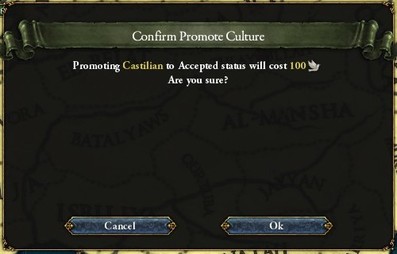
Whilst the Merchants continued building up their power, the Taifas had not been idle. Their own authority lay in the military, where many young sheikhs had posts, and so they continued expanding the army.
A large army is useless when armed with old weapons, however, so the nobles also invited a celebrated military engineer from Palermo.

Alias Blasi was appointed as head of the New Mubazirun, where his duties would include everything from drilling new recruits to planning out war strategies and battlefield tactics.

Alias also brought blueprints of Italian weaponry with him. The Italians had been bogged down in a long conflict with the Merchant Republic of Provence in recent years, and whilst the wars devastated the Italian countryside and depopulated entire towns, it also led to rapid advancements in military technology, advancements that the Andalusi quickly adopted and adapted.
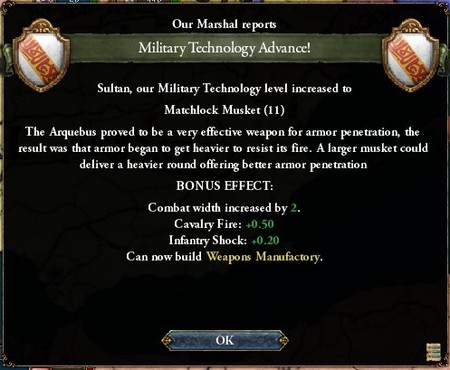
The New Mubazirun – reformed by Sultan Hakam and his loyalists – quickly grew to become famous throughout not just Iberia, but all of Europe. This was the first truly professional army of Andalusia, and the devastating speed with which it had defeated and occupied Castille showed the entire world that it was a force to be reckoned with.
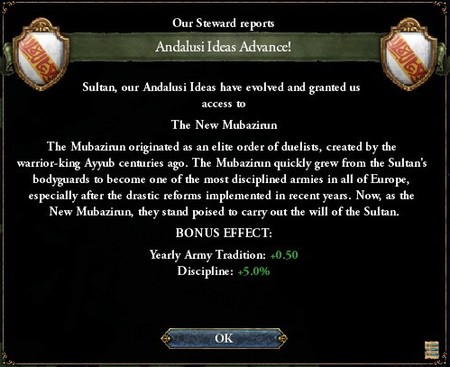
Late in 1525, word reached Qadis that the High King in Dublin had formally annexed Brittany into his empire, presumably because a land border with the French was useful to him.

But this aggressive annexation also seemed to inspire a false courage in the High King, because he delivered a speech in which he denounced Al Andalus shortly afterwards, claiming that the vast lands beyond the western ocean belonged to him, and him alone.

Much further east, meanwhile, a religious movement was gradually stirring. The small town of Klaipéda was situated on the Catholic-Orthodox border, and as such had been subjected to countless raids, sacks and massacres throughout its unfortunate history. Recently, however, a clergyman had managed to rouse the peasantry behind him, delivering fiery sermons in which he condemned the Papacy as nothing more than a corrupt, money-grabbing order of fools.
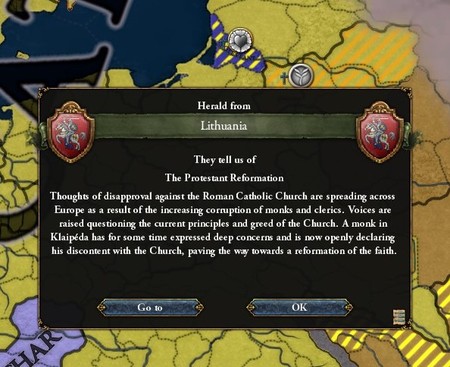
This was just some nameless man in a tiny village at the edge of the world, however, and nothing was likely to come of it.
More importantly, in the Near East, a war had broken out between Crusade Egypt and the Armenian Sultanate. The Armenians were led by the very young Sultan Berdar, new to the throne but very able on the battlefield, much like his counterpart across the Mediterranean.

Speaking of Sultan Hakam, Moroccan envoys arrived in Tulaytullah early in 1528 to meet with him. It seemed as though the many gifts sent to Marrakesh over the past few years paid off, because the Almoravid sultan offered to wed his daughter to Hakam, renewing the ties between the two kingdoms.
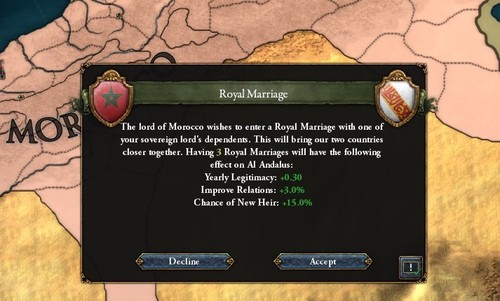
Sultan Hakam, as was common knowledge throughout Qadis and Tulaytullah, was not particularly… inclined towards women. At the insistence of the Majlis, however, he was forced to wed young Silya Almoravid, with their marriage reforging the alliance between Al Andalus and Morocco.

From the very beginning, however, their marriage was a tenuous one. Hakam refused to visit her chambers, attend her dinners or even talk to her, acting as though Silya didn’t exist. And before long, perhaps to spite her husband, Silya began an affair with a high-ranking vizier, a crime that carried the death sentence.
Hakam, however, truly didn’t care. He let the affair go on, uncaring so long as the union never bore a child. Their marriage was purely one of convenience, anyways.
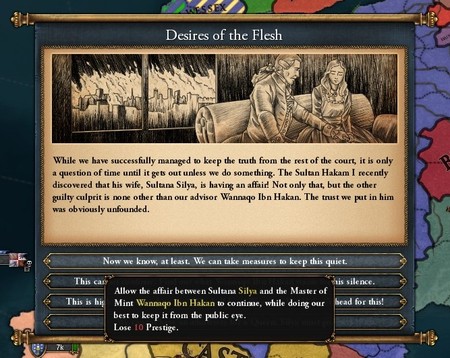
In fact, it was beginning to seem like Hakam didn't care about anything anymore. All of his dreams of conquering Iberia and pushing into France were abandoned, he didn’t even have the courage to spar anymore, much less lead an army into battle. And to add to that, his injury had never fully healed, making it a pain just to walk without a cane.
Instead, Sultan Hakam turned his attention to developing Tulaytullah, as his father had done before him. He made his mark by funding the re-construction of the House of Knowledge, devoting mountains of gold to everything from the reparations of ancient books to the construction of entire libraries, and went on to invite alchemists, mathematicians, engineers, philosophers and artists from all across the known world to teach at it.
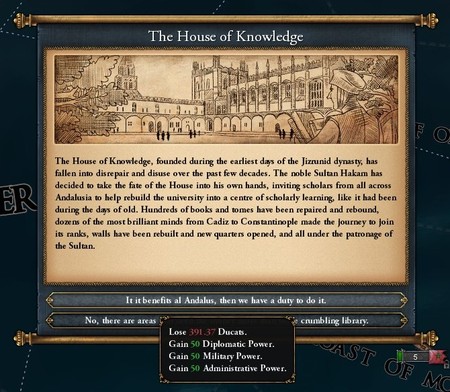
Before long, the newly-built House of Knowledge was flourishing, attracting famous scholars and highborn lords alike. Hakam took a particular interest in his family’s history, however, and became the patron of countless chroniclers and poets, all of whom compiled great histories of the Jizrunid dynasty.
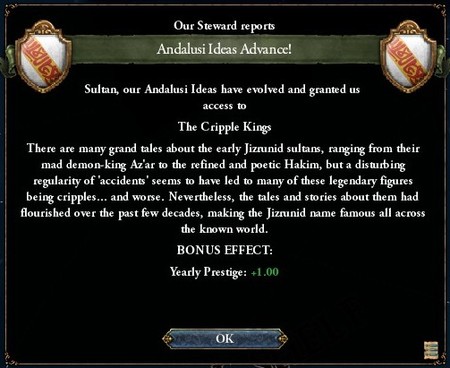
Back in Qadis, the Merchants’ fiscal reforms finally began paying off. The reorganization of the administration, the founding of new trading hubs, and the jizya tax levied on the dhimmi all led to income greatly improving, and before long the treasury was overflowing with gold.

A big chunk of this income was redirected into colonial pursuits, with the Majlis setting up new colonial companies in the vast western lands – Gharbia.

Claiming Gharbia was pointless, however, if nobody actually settled the land. To this end, the Merchants’ began offering huge land and monetary grants to anyone willing to make the journey across the Great Ocean, and the trickle of migrants began widening into a flow.
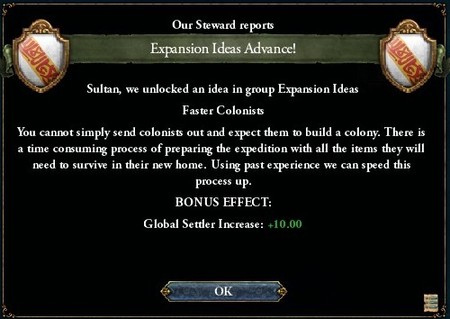
Within a few short years, four islands in Juzur al-Qarbiya were settled by Andalusi Muslims, with their vast riches carried back to Iberia by the ship-load.
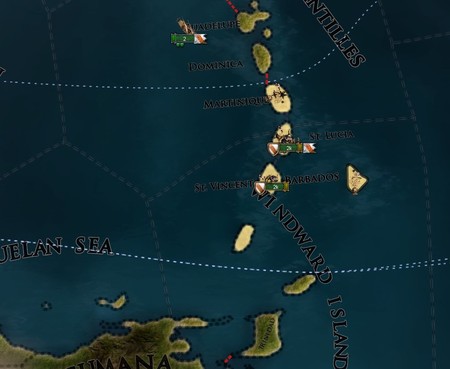
These islands were not exactly empty, however, there existed significant native populations in many of them. Whilst initial contact had been friendly enough, clashes inevitably broke out between natives and immigrants, many turning bloody. Hoping to assimilate the natives into local populations, the Ulema sent cartloads of missionaries to convert them to the true faith, by force if necessary.
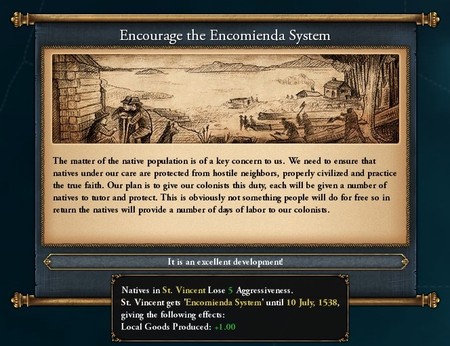
At the same time, exploratory missions were launched further west, with sailors charting out the coasts of the vast continent. It quickly became obvious that the Caribbean natives were not alone, and that there were entire empires waiting to meet the explorers on the mainland.
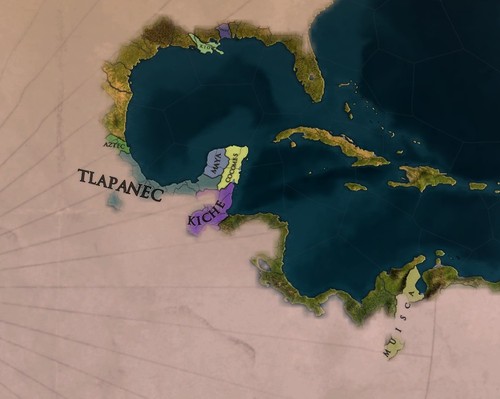
Carrying migrants westward and bringing riches back was no easy task, however, and the Merchants were forced to undertake monumental shipyard projects to build ships durable enough to withstand the voyage across the Atlantic.

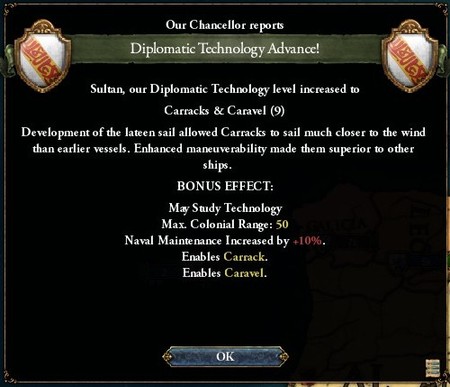
And obviously, sugar and tobacco were not the only thing these ships brought back with them, many also carried plague-infested rats and disease-ridden fleas. The first influenza outbreak was in Madeira, where one merchant vessel led to the death of thousands of peasants, forcing the Majlis to order that the entire island be quarantined just to contain the plague.

Back in Europe, a war erupted between Bavaria and Italy, with the Holy Roman Emperor calling Provence into the war as his ally. Italy was already bogged down in a war with Croatia, and now facing three enemies in three different directions, its prospects were not very hopeful.
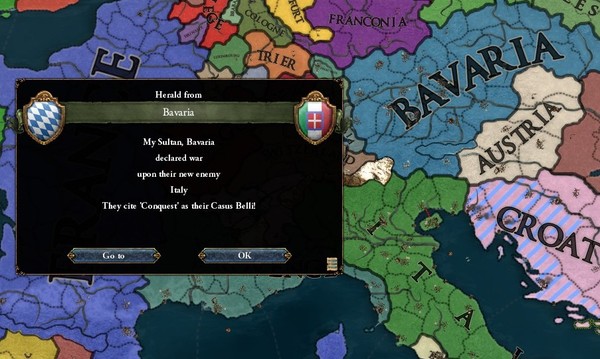
In the east, on the other hand, a war was just coming to an end. Sultan Berdar had dealt the Catholic Crusaders a stunning defeat, surprising many as he stormed across the Levant, and forced them to cede a significant chunk of Syria in the ensuing peace. Armenia was quickly proving itself an equal to any and all of its neighbours.

Berdar was obviously not satisfied with a single victory, however, because he immediately marched his army in the opposite direction and launched an invasion of the Latin Empire.
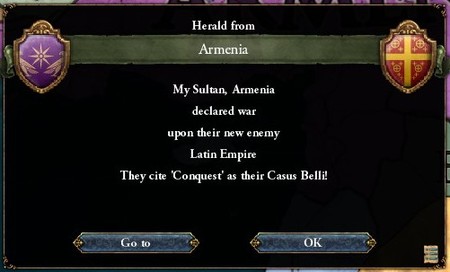
The League of Merchants were not interested in a distracted Italy or an empire on the rise, their attention was further south, where the Moroccans continued their expansion in West Africa.
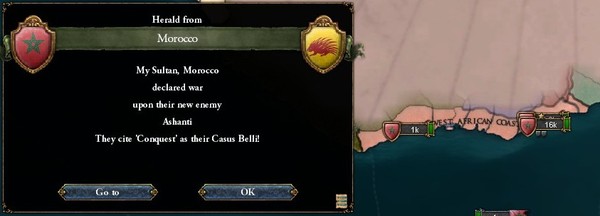
All of this was overshadowed by what was happening in the Far East, however, where the war between two lumbering giants had finally come to an end. The Great Song – once rulers over all China – were finally defeated after a bloody war with the Bajkal Horde, and were forced to recognize their authority because of it.
But the Great Khan was not satisfied with that. He went on to move his capital far from Lake Bajkal, claim the Mandate of Heaven, and proclaim the dawn of a new dynasty…

This was well beyond the interest of the Majlis – for now, at least. The islands they’d claimed in Gharbia were already growing too large to be governed from halfway across the world, so the Majlis appointed a prominent merchant to rule as Muqta of Juzur al-Qarbiya – Governor of the Caribbean Islands.

By now, it was quickly becoming obvious that the vast western continents were rich and full of potential. Other powers were beginning to creep in, and the Moroccans were first, with the Almoravid Sultan funding a colonial expedition to a large island just west of Jizrunid possessions.
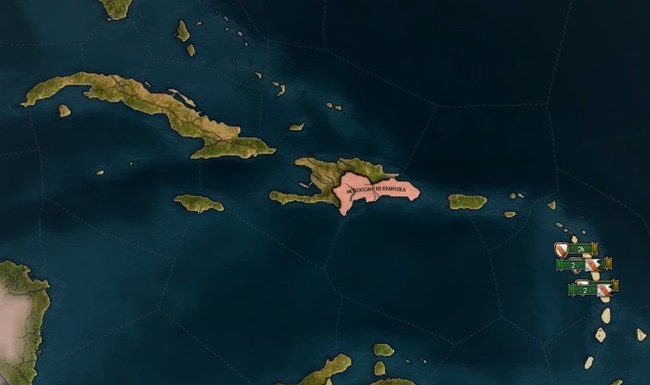
In Tulaytullah, meanwhile, Sultan Hakam was busy with his own plans. He was determined to never see battle or blood again, but that didn’t mean he couldn’t forge himself a name worthy to be sung.
Late in 1538, he led the New Mubazirun into Leónese territory without warning. León was meant to be a protected vassal of Al Andalus, but Sultan Hakam pushed straight towards the capital, demanding that it be surrendered or razed to the ground.

The gamble paid off, and the prince surrendered León, the city that had once served as the capital of the United Kingdoms of Christian Iberia. Hakam marched into it as a conqueror, and though he kept his word and avoided sacking the city, he still plundered a great many priceless treasures and historical artifacts, carting them back to Tulaytullah.
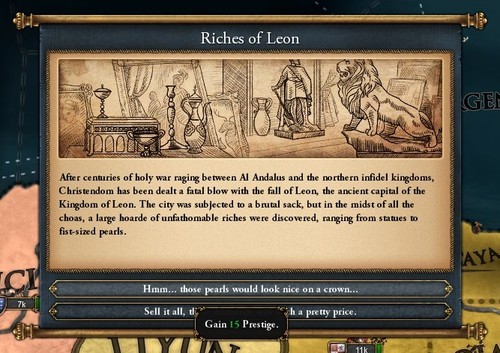
In the east, an actual war came to an end with the capture of the Holy Roman Emperor on the battlefield. The Italians had somehow managed to crush Croatia, repel Provence and outmaneuver Bavaria all in a single year, dealing countless crushing defeats to the enemy.

As one war ends, however, another begins. The French finally felt confident enough to launch another invasion of the Celtic Empire, quickly pouring into Brittany whilst simultaneously landing troops in Britain.
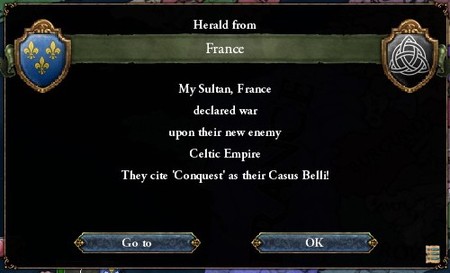
This presented the perfect opportunity to attack one of Andalusia’s most hated rivals, to strike whilst they were distracted, to trap their armies overseas and pillage their lands.
Once, Sultan Hakam would have pounced on such an opportunity without a second thought. Not anymore, however, he was content to feast on delicacies and enjoy the pleasures of his male companions instead. In fact, he even renounced his claims to Cagliari, the island that had once served as the link between Iberia and Sicily.
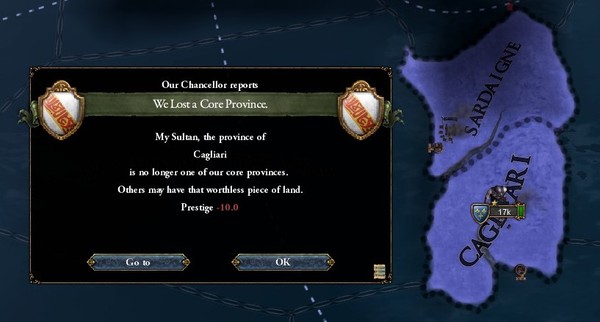
For his religious brethren, however, this was too much. Sultan Ghanim of Morocco was furious upon hearing that the Andalusi would not launch an invasion, going so far as to send the heads of Andalusi diplomats straight to Tulaytullah. Hakam didn’t retaliate, wary of aggravating the Almoravids too much, and fracturing their already-fragile alliance.

Whilst Sultan Hakam faded into obscurity, the Armenian Sultan had been showering himself with glory, besting the Latin Christians in battle after battle. After forcing them to accept his terms, all of Asia Minor was under Muslim control for the first time in centuries, with Armenia now stretching from Yerevan to Chios.

Armenia was far larger and much more powerful than it had ever been, made up of not just Armenians, but also Greeks, Arabs, Georgians and Azeri. Sultan Berdar had conquered the Despotate of Nicaea, he had humiliated the Crusaders and he had expelled the Latin Empire from Asia.
Berdar was a notoriously ambitious man, however, and he didn't stop there. Late in 1539, he claimed the titles of Sultan of Rûm and Caliph of Islam for himself, as his ancestors had done centuries past. The Sharifate of Mecca quickly recognised his claim in return for help against the Egyptians, and before long, large parts of the Middle East followed suit and bowed to his authority.

In Europe, the attention of kings and peasants alike were fixed on something much greater. Spreading like wildfire through farm and field, town and city, castle and fort, the so-called Protestant Reformation had quickly transformed from a mere speech to a revolution.
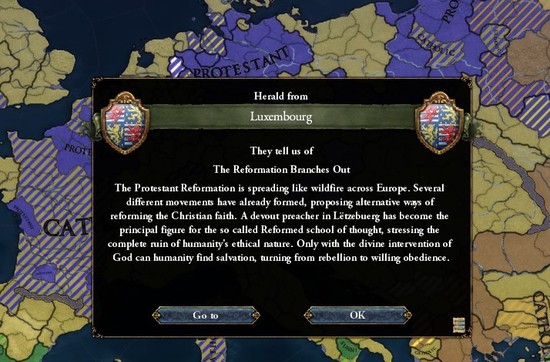
The Papacy reacted far too late, and by the time the Pope took note kings and princes from the Baltic to Germany to France had already proclaimed their adherence to Protestantism, refusing to recognise his authority any longer. What one man had started in a small village in Lithuania had quickly escalated into a continent-wide movement, one that would spark some of the bloodiest wars in history, one that decide the fates of entire kingdoms, and one that would forever change the Empire.
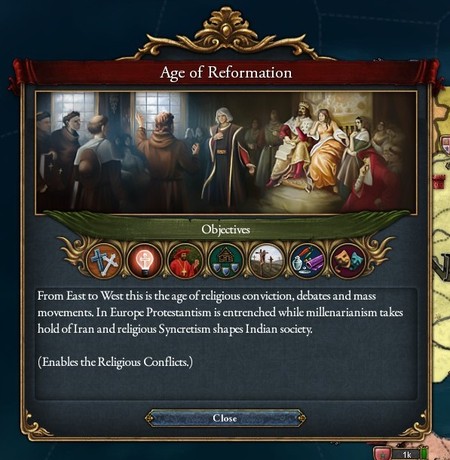
Back in Tulaytullah, however, the only news of any importance was the sudden death of the Sultan. Hakam had apparently choked on something especially savoury, and whilst many suspected foul play, there was no proof to back it.
One thing that can be said, however, is that Hakam’s brother marched to Qadis surprisingly quickly. He entered the city with the New Mubazirun behind him, and was crowned as the new sultan of Al Andalus just hours later.
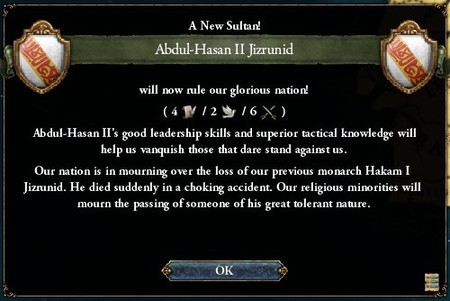
World map:
